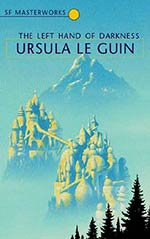
![]() pizzakarin
pizzakarin
7/24/2014
![]()
Perhaps apropos, my thoughts have followed two paths regarding this book.
First is the path of thoughts about the book. Second is the path of thoughts around the book.
I enjoyed the book in general. An envoy from humanity's coalition of planets (it's not really an Empire) is sent down to Winter to invite the planet into the coalition. The envoy is thrown into the deep end of a complex political situation and environment and the story is around the journey he goes through as a result. I'm not doing the plot justice, but there are many reviews out there that coherently explain the plot. Themes of friendship, pride, control, survival, and the nature of truth infuse the envoy's travels, making them interesting and thoughtful.
As far as my thoughts around the book, I can't say that they are more important than my thoughts about the book, just more numerous. Particularly I couldn't help but compare the book to Ancillary Justice because of their opposite use of gender pronoun assumptions. The Left Hand of Darkness has a male narrator in a non-gendered society, seeing maleness everywhere (and being startled every time he sees femininity in anyone he's gotten used to thinking of as male), and using all-male pronouns. Ancillary Justice has a gender neutral protagonist in a gendered society whose language is not gendered, not always recognizing gender, and using all-female pronouns because of that and because the language the book is (meta?)narrated in is gendered. The similarities in the two books mostly end there, but serve as examples of the way that this literary-device causes the reader to feel. In Left Hand of Darkness the world feels filled with men and I found myself irritated at the narrator for failing to adapt himself, in language and thought, to his surroundings. In Ancillary Justice, the world seems filled with women and I was more forgiving because the protagonist was not misgendering as much as struggling to gender and being linguistically ignorant. But in either book, the discrepancies between protagonist-pronoun-proscribed (described?) gender and actual gender forms a barrier preventing the reader from being truly immersed in the world.
In all, I would not classify the book as a "must read" and I don't presume to decide if it is an "important" book, but it is good even when the discussion around it (rather than about it) is stripped away.
http://www.twitter.com/pizzakarin